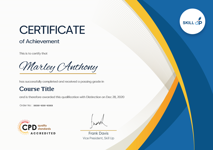Economic Decision-Making: Theory and Applications
Skill Up
Summary
- Certificate of completion - Digital certificate - Free
- Certificate of completion - Hard copy certificate - £9.99
- Exam(s) / assessment(s) is included in price
- Tutor is available to students
Add to basket or enquire
Overview
Have you ever wondered how the world economy works? How are prices determined? What causes inflation? What are the different types of economic systems?
If you're interested in learning about these and other economic concepts, then the Economics Course is for you. In this course, you'll learn about the fundamental principles of economics, including supply and demand, market failure, and economic growth and much more!
Learning outcomes:
At the end of this economics course, you will be able to
- Understand the fundamental principles of Economics and its relevance in society.
- Analyse the market system, supply, demand, and price mechanisms.
- Examine market failures and the role of government intervention.
- Explore concepts of production, costs, and different market structures.
- Evaluate macroeconomic indicators such as GDP, unemployment, inflation, and fiscal policy.
CPD
Course media
Description
Welcome to the captivating world of Economics, where you will unravel the mysteries of how societies allocate resources to satisfy unlimited wants and needs. This economics course provides an in-depth exploration of key economic concepts and their applications.
Begin with an introduction to Economics, understanding its fundamental principles and the role it plays in shaping individual choices and societal outcomes. Dive into the market system and the circular flow model, examining how goods, services, and resources are exchanged.
Explore the forces of supply, demand, and prices, unravelling the mechanisms that determine market equilibrium. Learn about elasticity and its impact on consumer behaviour and producer decision-making.
Delve into market failures, understanding when and why markets may fail to allocate resources efficiently. Examine production and cost concepts, analysing how businesses optimise their operations.
Investigate different market structures, comparing the characteristics of perfect competition and monopoly. Explore the complexities of money, banking, and the financial system, gaining insights into their influence on economic activity.
Measure GDP and evaluate economic growth, analyse unemployment and its implications for society, and explore the factors contributing to inflation. Investigate income distribution and poverty, examining the challenges and policy interventions aimed at reducing inequality.
Finally, dive into the realm of international finance, understanding the intricacies of global economic interactions. Explore fiscal policy and its role in stabilising economies and promoting growth.
By the end of this course, you will possess a solid understanding of key economic concepts and their applications, enabling you to analyse and interpret economic phenomena in the real world.
Enrol now and unlock the world of Economics, where you can navigate the complexities of markets, policy, and wealth creation.
Who is this course for?
- Students studying Economics, Business, or related disciplines.
- Professionals seeking to enhance their economic literacy and decision-making skills.
- Individuals interested in understanding the principles that shape economic systems.
- Policy-makers and government officials involved in economic decision-making.
Career path
- Economist: £30,000 - £70,000 per year
- Financial Analyst: £30,000 - £60,000 per year
- Market Research Analyst: £25,000 - £45,000 per year
- Policy Analyst: £25,000 - £50,000 per year
Questions and answers
Currently there are no Q&As for this course. Be the first to ask a question.
Certificates
Certificate of completion - Digital certificate
Digital certificate - Included
Certificate of completion - Hard copy certificate
Hard copy certificate - £9.99
Inside the UK student have to pay an additional delivery fee of £10, whereas International students are required to pay an additional fee of £19.99 to receive a hard copy of the certificate delivered to their address.
Reviews
Currently there are no reviews for this course. Be the first to leave a review.
Legal information
This course is advertised on reed.co.uk by the Course Provider, whose terms and conditions apply. Purchases are made directly from the Course Provider, and as such, content and materials are supplied by the Course Provider directly. Reed is acting as agent and not reseller in relation to this course. Reed's only responsibility is to facilitate your payment for the course. It is your responsibility to review and agree to the Course Provider's terms and conditions and satisfy yourself as to the suitability of the course you intend to purchase. Reed will not have any responsibility for the content of the course and/or associated materials.



